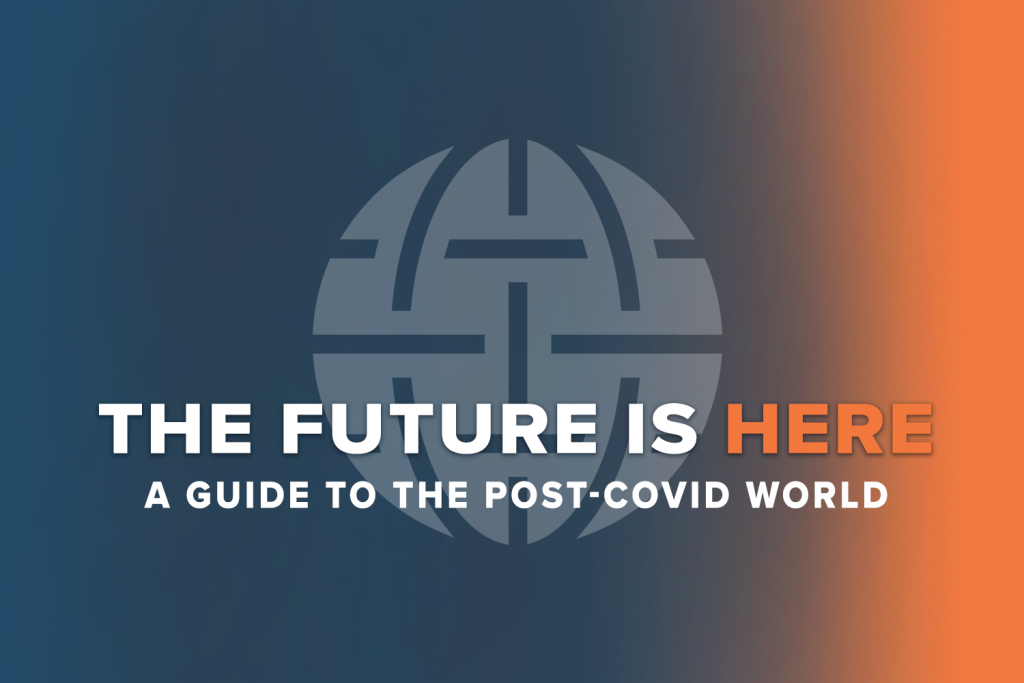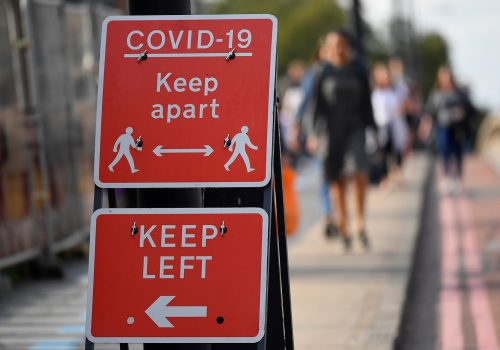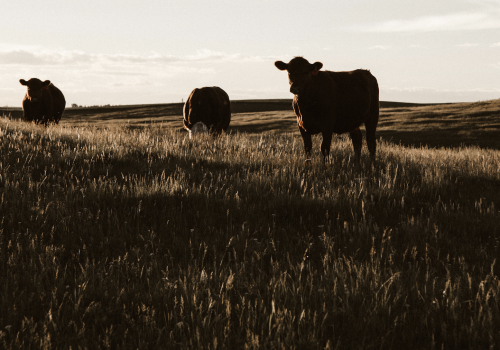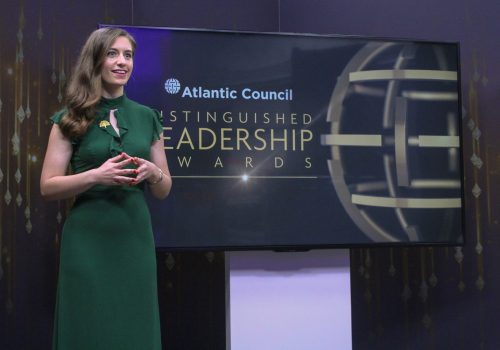The future is here: A guide to the post-COVID world 10/22/2020
Welcome to your guide to where the world is headed during the pandemic era and beyond. Each week, we’ll bring you the latest and most significant expert insights and international news about how coronavirus is reshaping international affairs. To stay updated each week, sign up to the newsletter here.
Let’s take a spin around the globe, in seven minutes or less.
In top stories this week:
- It’s possible coronavirus will become as widespread as the flu, and a vaccine isn’t a silver bullet. So what is humanity’s plan B?
- Virus + robots = double the disruption for workers.
- Retirement plans are getting rocked, in the latest sign that the pandemic will have long aftershocks.”
- But first… we have a special dispatch from Jordan Wolken of the Atlantic Council’s Africa Center. Here’s his take on this week’s big story.
The big story
This week’s key theme: Empowering women will be critical for achieving inclusive post-pandemic growth
The COVID-19 pandemic has caused disproportionate harm to women in a number of ways, from increasing incidences of gender-based violence to making it harder for them to earn a living. The corollary is that investing in women-owned businesses and technologies that benefit women, along with promoting women to key leadership positions, will be critical to generating an inclusive economic recovery.
This is certainly true in Africa, where most women work in the informal sector and continue to face limited educational and economic opportunities.
“Women’s economic empowerment is a human right and a human development concern–as well as a contributor to equitable growth and sustainable development,” said Charity Wallace, managing director of global women’s issues at the US International Development Finance Corporation (DFC), at the Investing in Africa’s Future conference jointly hosted this month by the DFC and the Atlantic Council’s Africa Center.
Subscribe to The future is here: A guide to the post-COVID world
Sign up for a weekly roundup of top expert insights and international news about how coronavirus is reshaping international affairs.

Placing women at the center of Africa’s economic recovery
Research shows that investing in women has a multiplier effect on local economies. Wallace pointed to a McKinsey Global Institute study that forecasted Africa could miss out on $316 billion in GDP growth if the gender gap persists. To help close this gap, the DFC’s 2X Women’s Initiative has committed to one billion dollars of investment in Africa’s women.
At the same event, former Liberian President Ellen Johnson Sirleaf, the continent’s first democratically elected female leader emphasized women’s utility in a time of crisis, drawing on her own experience responding to Ebola in Liberia: “In our own case, when we had to battle [the] virus, we found that those who were able to be effective were women–the community health workers, the first responders. Yet, no matter what we do, for women to reach the pinnacle is so difficult.”
The bottom line: The obstacles women face to economic empowerment have only grown more daunting during the pandemic, which places an even higher premium on pursuing more educational opportunities for women and greater access to resources such as digital technologies and low-interest credit once the public-health crisis recedes.
The big picture
This week’s key theme, visualized: How COVID-19 is holding back women as economic actors
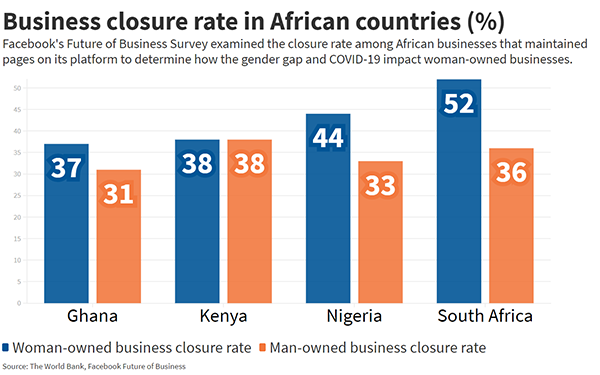
The world in brief
Insights from across the planet, in ten bullets or fewer
- Coronavirus could become as widespread as the flu, but a vaccine could still be a year out. COVID-19 is likely to become as endemic as the flu and a vaccine is unlikely to eradicate it, says Patrick Vallance, the United Kingdom’s chief scientific adviser, CNBC reports. The CEO of Roche, Severin Schwan, tried to temper expectations too, by saying that hopes for a vaccine being found quickly are still too high, Bloomberg reports. Most people probably won’t get access to a shot until the second half of 2021, Schwan adds.
- The economic crisis triggered by the pandemic has dented retirement prospects. Billions of people worldwide with pensions may have to work for longer or have lower income later in life due to high government debt that has led to lower returns on pensions or reforms that raise the retirement age, the Financial Times says. But before retirement beckons, older workers face higher unemployment rates than their mid-career peers for the first time in almost fifty years, according to a study by the New School university in New York City, The Associated Press reports.
- Virus and robots: a troublesome combination for workers in the future. While the rise of machines and automation will lead to millions of job losses, the net gain will be an extra twelve million jobs by 2025, the World Economic Forum (WEF) says. The pandemic-spurred recession is creating double the disruption for workers, adds the WEF, which says up to half of all workers will need some retraining in the next five years to adjust to the labor demands of a more automated and post-COVID economy.
- But today, factory workers need support to bear the effects of the pandemic. The International Labor Organization says the apparel industry must do more to help workers in Asia, where the pandemic has left many of the 65 million workers in garment factories struggling with job loss or fewer working hours, The Associated Press reports.
- QUOTE: “Forget about the US elections or fiscal stimulus—restrictions creeping higher is the single biggest near term risk to the outlook,” economist Arend Kapteyn of Swiss bank UBS wrote in a note to clients, CNBC reports. “If countries start to impose ‘circuit breaker’ lockdowns that last just several weeks, that may already be enough to turn a positive (fourth quarter) growth rate negative.”
- Remember the toilet-paper rush? Fully stocked homes may be here to stay. New consumer behavior, such as keeping homes fully stocked with items like packaged food, disinfectants, and toilet paper, may stick for the long term, Bloomberg reports. Household-products giant Proctor & Gamble, grocer Albertsons, and Lysol maker Reckitt Benckiser reported increased demand. The pandemic has pushed people to buy more vitamins too, giving packaged-goods firm Nestle a sales boost.
- London’s Heathrow will begin testing passengers traveling to Hong Kong. A negative COVID-19 test is required to take the trip, so customers can now pay eighty pounds for a rapid test before checking in to their flight, the BBC reports. Meanwhile, the European Union is updating its travel restrictions for the first time in two months, allowing arrivals from Singapore but barring passengers from Canada, Tunisia, and Georgia, Bloomberg says, citing an unidentified official.
- China: a boon to European exporters… but world economic savior? While China’s economic growth is gaining pace, some economists say pinning hopes on Beijing to lift the global economy from its coronavirus doldrums may be wishful thinking, The Wall Street Journal reports. Expecting China to spend, make goods, and export at the rate it has been is unrealistic as the government addresses debt levels and uncertainties increase worldwide, they say. Still, demand from China in recent months has helped industrial production in Europe drive economic recovery there, the Financial Times says.
- One step at a time may not be fast enough to address low-income countries’ debt. Creditors and debtors need to take more urgent action to address low-income countries’ increasingly unsustainable debt burdens triggered by the pandemic, says Kristalina Georgieva, head of the International Monetary Fund, Reuters reports. The Group of Twenty major economies froze official bilateral payments; although this is helpful, it is only part of the solution.
- QUOTE: “While many women in developed economies fear that the pandemic has pushed them back into the traditional gender roles of the 1950s, their Mexican hermanas appear never to have left [those gender roles],” Jude Webber writes in the Financial Times. Women are overpaid and underworked in Mexico, and it is showing in their economy. The country’s gross domestic product is expected to drop 9 percent this year. And for every Mexican man that has lost his job, two Mexican women have lost theirs during the pandemic, Webber adds.
- The plant craze may be just the thing to keep some people sane in the pandemic. Getting your hands dirty and planting bulbs has become a kind of therapy this year, writes Adrian Higgins in The Washington Post. “I can’t think of anything more forward-looking or reassuring at the moment than planting tulip bulbs.” While next month is planting season, demand for bulbs is high, so sooner may be better than later for future gardeners.
The inside scoop
Insights from the Atlantic Council
